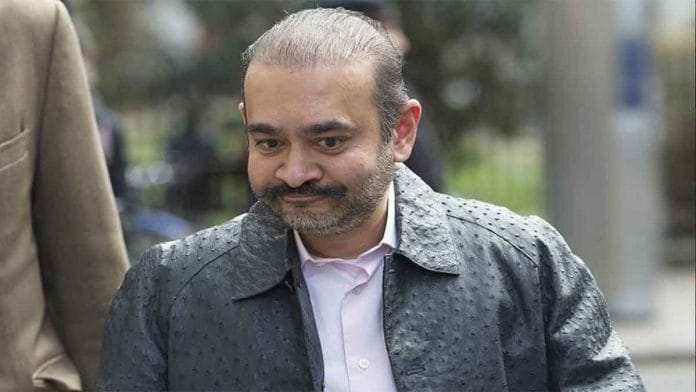New Delhi: In the past four years, the CBI sent the most requests for red corner notices (RCNs) — which Interpol issues against fugitives — in 2018, the year that saw a series of bank fraud cases, which includes the infamous $2-billion Punjab National Bank scam involving businessman Nirav Modi and his uncle, Mehul Choksi.
According to data that the Modi government submitted in Parliament Friday, the CBI sent 123 RCN requests to Interpol in 2018, as against the 94 in 2017.
In 2016, the CBI had sent 91 requests for RCNs to be issued, while in 2019, until 15 July, RCN requests in 41 cases were sent to Interpol.
“Out of 123 requests in 2018, 76, including that for Nirav Modi, were approved and notices issued,” a CBI source said. “It took three requests from CBI for Interpol to issue an RCN against Mehul Choksi.”
“Interpol had raised several objections to Choksi’s case being mixed up with that of Nirav Modi, while both were operating in individual capacity, heading different companies,” the source said, adding the government sent a stern response to Interpol, saying that sharing sensitive details of the case would mean “helping the offender”.
Eventually, Interpol issued an RCN against Choksi.
An RCN is a request issued by the Interpol to locate and provisionally arrest an individual awaiting extradition. It is issued by the general secretariat of the global police body on the request of a member country or an international tribunal based on a valid national arrest warrant.
Once issued, the Interpol asks its 192 member countries to arrest or detain the person if spotted in their countries after which extradition or deportation proceedings can begin.
Also read: ED Mumbai transfers officer probing Nirav Modi, Delhi office reinstates him within hours
CBI’s best success rate with RCNs came in 2016
While 2018 saw the CBI send the most requests to Interpol, its best year, in terms of the red corner notices being issued, was in 2016. According to the data submitted in Parliament, of the 91 requests sent in 2016, Interpol approved 87 of them, a success rate of 95 per cent.
In 2018, 76 or 62 per cent of the total 123 requests were approved. In 2017, the CBI had sent 94 requests, of which RCNs were issued in 84 cases — a success rate of 84 per cent.
Of the 41 cases up to 15 July this year, 32 have been approved.
One of the cases in 2017 that the CBI failed to secure a red corner notice was a request against Islamic preacher Zakir Naik, who is facing an NIA (National Investigation Agency) probe over charges of committing unlawful activities in India and is also an accused in a money laundering case being investigated by the Enforcement Directorate.
The RCN and how it is issued
When an investigation agency — be it CBI, ED or NIA — manages to get Interpol to issue a red corner notice against a fugitive, it ensures that the accused isn’t able to leave a country.
Every time fugitives with RCNs against them try to pass through immigration in any country, their names immediately flash on the system of the clearing authority.
The fugitive is then detained and then handed over to the authorities.
“An RCN is considered to be a request for provisional arrest of an individual who is pending extradition,” an officer of a security establishment explained. “However, it is often issued only after the Interpol is convinced that it is not being used as a tool of harassment and that the case is a strong one.”
After a probe agency sends the request, the Interpol scrutinises it and in case they have any objections, they take it up with the authorities concerned.
At times, the Interpol even asks the agencies concerned to share relevant files, the details of the investigation and even evidence to weigh the merit of the case and if at all it requires the issuance of an RCN.
It is only after the Interpol is fully convinced, that an RCN is issued. Once issued, Interpol then shares the information with its member countries.
Also read: The FCRA violation case behind CBI raids on Indira Jaising, Anand Grover and their NGO






